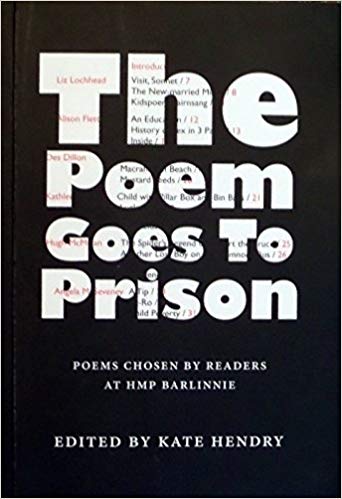
The last time I was in Edinburgh, I dropped in to the Scottish Poetry Library and picked up a copy of The Poem Goes To Prison, edited by Kate Hendry. This is an anthology of poems selected by prisoners for prisoners. It was curated by Kate Hendry while she was teaching at HMP Barlinnie, Scotland’s largest prison, located just outside Glasgow. The collection is highly accessible. Many of the poems are followed by brief (tweet-like) comments from prisoners, and at the back of the book are short bios of contributing poets along with their own comments on the poems. In other words, there are enough clues that readers don’t have to twist their brains in knots trying to decode the poems. Some of the poems deal with remembered pleasures, like having a bath. Some, with relationships, especially with people who are odd or troubling. And a surprising number deal with what might best be described as language politics.
Scotland and Canada could provide models for one another when it comes to issues like cultural sovereignty (think: Scotland in relation to England, Canada in relation to the U.S., Québec in relation to Ontario & western Canada, First Nations in relation to everybody), preservation of local language (Scots, French, Cree, etc.), and economic self-determination. Prison strikes me as a pot where all these issues come to a boil. The most culturally and economically vulnerable end up being the ones who fill up most of the prison cells and it becomes easy to ignore or dismiss the broader concerns they represent.
So we have “An Education”, by Alison Flett:
afore ah wenty skule
ah didny reelize
yi wur supposety say
know steddy ken
though steddy butay didny reelize
a telly wiz reely
a televisionah didny reelize
it wiz rongty say fuck
cunt
bastard
or tok aboot yir da beein steemin
or yir ma going mentul aboot munny
or yir brur in thi jaleah fukn ken diffrint noo but
”I like that last line. Although she’s been told, she’s going to stick to her own way of expressing herself.”—BB
Education often ends up being just another institution the dominant group uses to enforce conformity to its own likeness. In this case, it’s posh talk and middle-class morals.
Taken on its own, the book is light, humourous, accessible. But the story of the book’s publication has a disturbing afterword that reminds us of harsher realities. After a stint at HMP Barlinnie, Kate Hendry went on to teach at Shotts Prison, Lanarkshire. There, she was suspended pending an investigation into an “inappropriate relationship”. Even on the terms expressed through official media channels, it appears Hendry did nothing. A prisoner (who had kept a severed head in a refrigerator) tried to get a note to her expressing his affections but the note was intercepted. The problem is that the prisoner in question is smart and articulate and has posted his side of the story: the prison guards can’t produce the note in question because the whole incident was fabricated to oust a firecracker of a teacher who was encouraging subversive tendencies, etc., etc. The usual bullshit. Too bad she can’t leverage the scandal to sell more copies of the book. It’s worth the read.